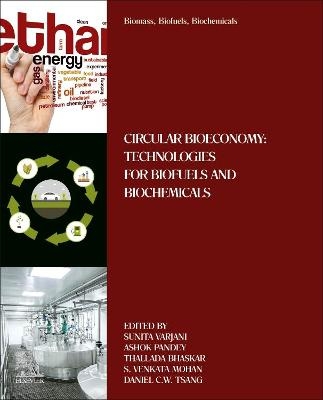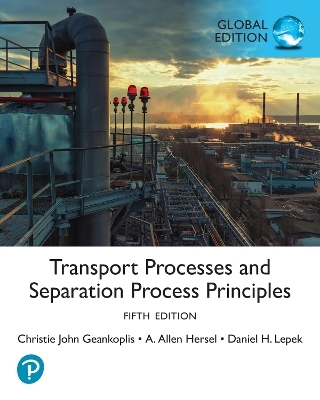
Biomass, Biofuels, Biochemicals
Elsevier - Health Sciences Division (Verlag)
978-0-323-89855-3 (ISBN)
Resources consumption and environment degradation necessitates a transition of our linear economy towards sustainable social and technical systems. As fossil resources are only projected to fulfill the needs of the population for the next couple of centuries, new tactics and standards must be created to ensure future success.
Dr. Sunita Varjani is Scientific Officer at Gujarat Pollution Control Board, Gandhinagar, Gujarat, India. Her major areas of research are Industrial and Environmental Microbiology/Biotechnology. She has worked as visiting scientist at EPFL, Lausanne, Switzerland. Dr. Varjani has authored more than 110 publications, including research and review papers, books and book chapters. She has won several awards, including Young Scientist Awards from Association of Microbiologists of India, International Society for Energy, Environment and Sustainability and AFRO-ASIAN Congress on Microbes for Human and Environmental Health, New Delhi; Top Reviewer Award - 2017, Bioresource Technology, Elsevier and Best Paper Awards in national and international conferences in 2008, 2012, 2013 and 2018. She is member of editorial board of Journal of Energy and Environmental Sustainability and has served as guest editor of special issues of Bioresource Technology, Environmental Science and Pollution Research, ASCE- Journal of Environmental Engineering and others. She is Management Council Member of the BRSI (www.brsi.in). Professor Ashok Pandey is currently Executive Director, Centre for Energy and Environmental Sustainability-India, Lucknow. He is HSBS National Innovation Chair (Biotechnology) and is/has been Visiting/Distinguished Professor in many countries. His major research and technological development interests are industrial & environmental biotechnology and energy biosciences, focusing on biomass to biofuels & chemicals, waste to wealth & energy, etc. Dr Thallada Bhaskar, Senior Scientist, is currently heading the Thermo-catalytic Processes Area, Bio-Fuels Division (BFD) at CSIR-Indian Institute of Petroleum, India. He received Ph D for his work at CSIR-Indian Institute of Chemical Technology (IICT) from Osmania University, Hyderabad in the year 1999. He carried out Postdoctoral Research at Okayama University, Okayama, Japan after which he joined as Research Assistant Professor and taught catalysis, chemical kinetics and thermodynamics for ~7 years. He has about 90 publications in journals of international repute, contributed 10 book chapters to renowned publishers (ACS, Elsevier, Woodhead Publishing, CRC Press etc) and 11 patents to his in his field of expertise in addition to 250 national and international symposia presentations. His 20 years of research experience cover various fields of science revolving around his expertise in heterogeneous catalysis thermo-chemical conversion of biomass, waste plastics and e-waste plastics into value added hydrocarbons. He has prepared several catalysts and thrown a light on the structure activity relationships of novel catalytic materials for hydrotreatment of fossil based crudes. His contributions to the field of sustainable hydrocarbons are in the form of process knowhow and catalyst developments. His patents and publications discuss crucial points encompassing wide areas of thermo-catalytic conversion like pyrolysis and hydrothermal liquefaction for biomass (agricultural, forest residues and aquatic biomass) and plastic waste (industrial and e-waste) conversion. In addition he worked on developing micro-channel reactors for several chemical reactions and separation processes. His other interests include utilization of non-conventional energies for the sustainable production of hydrocarbons utilizing the polymeric wastes available which will make the thermo-chemical methods of conversion more energy efficient. In view of his expertise, he is on the editorial board of 2 international peer reviewed journals and expert member of several committees. He received the Distinguished Researcher award from AIST (2013), Japan and Most Progressive Researcher award from FSRJ, Japan (2008). He is also the Fellow of Biotech Research Society of India and member of the Governing Council. He received the Raman Research Fellowship for the year 2013-14. He was also a JSPS Visiting Scientist to Tokyo Institute of Technology, Japan during 2009. He has carried out several research projects with great success with national and international collaborators. He has organized several international symposia in India and abroad in this area and visited several countries to deliver invited/ plenary lectures. Dr.S.Venkata Mohan is working as Principal Scientist in CSIR-Indian Institute of Chemical Technology, Hyderabad since 1998. He was a Visiting Professor at Kyoto University (2005) and Alexander von Humboldt (AvH) Fellow at Technical University of Munich, Germany (2001-02). His main research interests are in the domain of Environmental Bioengineering Specifically in the areas of Advance Waste Remediation, Aciodogenesis, Microbial Electrogenesis, Photosynthesis and Waste Biorefinery. He has authored more than 310 research articles, 36 chapters for books, edited 4 books and has 9 patents. His publication has more than 12,750 citations with an h-index of 62 (Google Scholar). He has guided 22 PhDs., 2 M.Phils and more than 100 M.Tech./B.Tech./M.Sc. students. Recently, Dr Mohan recently successfully demonstrated a pilot plant for biohydrogen production from waste for MNRE and waste fed biorefinery platform for CSIR. He carried out various industrial and consultancy projects in the area of environmental management. Dr Mohan is recipient of coveted ‘Shanti Swarup Bhatnagar (SSB) Prize’ for the year 2014 in Engineering Sciences from Government of India. He also received several awards and honours, which includes, Most outstanding Researcher in the field of Environmental Science in India- 2018 by Carrer360, as ‘National Bioscience award-2012’ by DBT, Government of India, SERB-IGCW-2017 for ‘Biohydrogen Technology’ from DST-SERB, Environmental Engineering Design Award 2017 by the National Design and Research Forum (NDRF) of Institute of Engineers, India (2017), ‘Prosper.net-Scopus Young Researcher Award in Sustainable Development -2010’ under Energy Category by United Nations University and Elsevier, ‘NASI-Scopus Young Scientist Award- 2010’ in Earth, Oceanographic & Environmental Sciences by NASI and Elsevier, Nawab Zain Yar Jung Bahadur Memorial Prize-1994 by The Institution of Engineers (India), etc. Dr Mohan is an elected Fellow of National Academy of Engineering, Biotech Research Society of India, Telangana and Andhra Pradesh Akademy of Sciences, International Forum on Industrial Bioprocesses, Institution of Engineers, International Society for Energy, Environment and Sustainability, etc. Dr Mohan is National Editor for Science Portal (EVS), subject Editor for the Journal of Energy, Associate Editor for Frontiers in Environmental Science and Frontiers in Energy Research and is serving on the Editorial Board of several journals viz., Bioresource Technology, Advances in Energy Research, Carbon Resources Conversion, etc. Prof. Tsang is a leading scientist in waste-to-resource technology, hazardous waste treatment, and carbon capture and utilization. Over the years, he has published more than 500 peer-reviewed papers in the top 10% of journals and has been invited to deliver keynote speeches or to chair seminars at international conferences. He was also awarded as a 2021 Highly Cited Researcher (Clarivate Analytics) for both Engineering and Environment and Ecology, with his professional contributions being recognized by local and international communities. He serves as Associate Editor for Science of the Total Environment, Critical Reviews in Environmental Science & Technology, Journal of Environmental Management, Journal of Hazardous Materials.
Section 1: Integrated technologies for the production of biofuels 1. Sustainable biorefineries for circular bioeconomy 2. Sustainable technologies for biodiesel production from microbial lipids 3. Integrated thermochemical and biochemical processes for the production of biofuels and biochemicals 4. Integrated technologies for extractives recovery, fractionation and bioethanol production from lignocellulose 5. Integrated technologies for biohydrogen production
Section 2: Integrated technologies for the production of chemicals and other value-added products 6. Integrated bio-based processes for the production of industrially important chemicals 7. Integrated processing of soybean for a circular bioeconomy 8. Integrated technologies for the production of antioxidant compounds and prebiotic oligosaccharides from lignocellulosic biomass 9. Integrated technologies for bio-based materials preparation 10. Sustainable technologies for damaged grains utilization 11. Sustainable technologies for the production of sophorolipids from renewable wastes 12. Sustainable chemical and biological technologies for the production of enantiopure added-value molecules in biorefineries 13. Sustainable production and applications of biochar in circular bioeconomy 14. Genetically modified microorganisms for the sustainable production of biofertilizers 15. Innovative protein and enzyme engineering processes for the production of biomass hydrolyzing enzymes 16. Hydrothermal liquefaction of biomass for the production of value-added products Bioconversion of waste glycerol from biodiesel industry to value-added products 17. Bioconversion of waste glycerol from biodiesel industry to value-added products 18. Integrated processes for the production of pharmaceutical products utilizing agricultural wastes 19. Sustainable production of succinic acid by utilization of agricultural wastes 20. Bioresource utilization for environmental and health management in aquaculture and fisheries 21. Algae as sustainable food in space missions
Section 3: Techno-economic analysis and life-cycle assessment in Circular Bioeconomy 22. Techno-economic evaluation and life-cycle assessment of integrated biorefineries within a circular bioeconomy 23. Circular bioeconomy approaches for sustainability and carbon mitigation in microalgal biorefinery 24. Life-cycle assessment and economic analysis for sustainable waste to energy technologies 25. Circular bioeconomy in agricultural food supply chain and value addition 26. Integrated approach for technology transfer awareness of traditional knowledge for upliftment of circular bioeconomy
| Erscheinungsdatum | 14.12.2021 |
|---|---|
| Verlagsort | Philadelphia |
| Sprache | englisch |
| Maße | 191 x 235 mm |
| Gewicht | 1360 g |
| Themenwelt | Technik ► Umwelttechnik / Biotechnologie |
| ISBN-10 | 0-323-89855-6 / 0323898556 |
| ISBN-13 | 978-0-323-89855-3 / 9780323898553 |
| Zustand | Neuware |
| Informationen gemäß Produktsicherheitsverordnung (GPSR) | |
| Haben Sie eine Frage zum Produkt? |
aus dem Bereich


